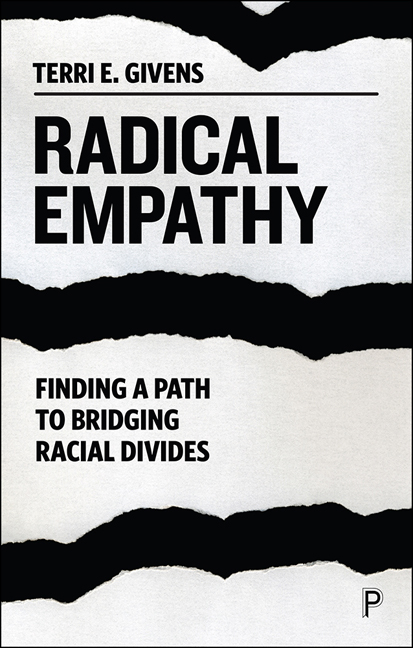Book contents
- Frontmatter
- Dedication
- Contents
- Note on the author
- Prologue:Writing in a time of crisis
- 1 Bridging divides: From racism to empathy in the 21st century
- 2 Getting to radical empathy
- 3 My family’s story: The isolation of internalized oppression
- 4 Racism and health disparities
- 5 Finding empathy in the academy
- 6 Love and marriage
- 7 Radical empathy in leadership: Creating change
- 8 Creating change at the national level: Restorative justice and working off the past
- 9 Revisiting the path to radical empathy
- Epilogue: The long road ahead
- Notes
- Suggested reading
- Index
7 - Radical empathy in leadership: Creating change
Published online by Cambridge University Press: 05 January 2022
- Frontmatter
- Dedication
- Contents
- Note on the author
- Prologue:Writing in a time of crisis
- 1 Bridging divides: From racism to empathy in the 21st century
- 2 Getting to radical empathy
- 3 My family’s story: The isolation of internalized oppression
- 4 Racism and health disparities
- 5 Finding empathy in the academy
- 6 Love and marriage
- 7 Radical empathy in leadership: Creating change
- 8 Creating change at the national level: Restorative justice and working off the past
- 9 Revisiting the path to radical empathy
- Epilogue: The long road ahead
- Notes
- Suggested reading
- Index
Summary
On January 21, 2009, I watched in Washington, DC, as newly elected President Barack Obama addressed the nation with a message of hope:
On this day, we gather because we have chosen hope over fear, unity of purpose over conflict and discord. On this day, we come to proclaim an end to the petty grievances and false promises, the recriminations and worn-out dogmas that for far too long have strangled our politics. We remain a young nation. But in the words of Scripture, the time has come to set aside childish things. The time has come to reaffirm our enduring spirit; to choose our better history; to carry forward that precious gift, that noble idea passed on from generation to generation: the God-given promise that all are equal, all are free, and all deserve a chance to pursue their full measure of happiness.
The outcome of the 2016 presidential election in the US and the election of Donald Trump was a stark repudiation of Obama's vision and presidency. It was a painful outcome for Black voters, who had overwhelmingly supported Hillary Clinton. CNN commentator Anthony Kapel “Van” Jones declared, “This was a whitelash against a changing country. It was whitelash against a Black president in part. And that's the part where the pain comes.”
The election revealed once again the divides that have always been part of American politics. Racism has been inextricably bound with politics in this country since its founding. President Obama managed to mobilize new voters, in particular minority voters, in two elections that seemed to indicate a shift in the country. In the meantime, Republican politicians at the state level developed a game plan to suppress minority votes, which helped Trump win, along with Russian interference, as found in an investigation by the Republican-led Senate Intelligence Committee that concluded in August of 2020: “The Russian government disrupted an American election to help Mr Trump become president, Russian intelligence services viewed members of the Trump campaign as easily manipulated, and some of Mr. Trump's advisers were eager for the help from an American adversary.”
For many in this country, President Obama represented a leader who could finally bridge the racial divides in the US. His rise to prominence began with his Keynote Speech during the 2004 Democratic National Convention.
- Type
- Chapter
- Information
- Radical EmpathyFinding a Path to Bridging Racial Divides, pp. 115 - 132Publisher: Bristol University PressPrint publication year: 2021



